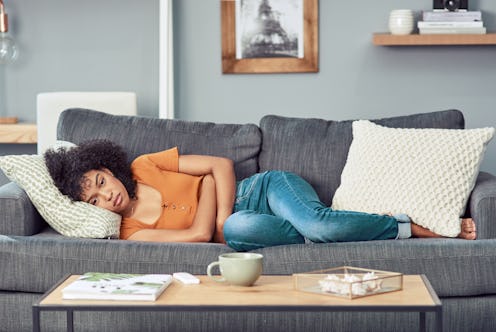Life
Experts Explain Why You’re Sore While WFH, Even If You’re Not Working Out

You wake up and muscles you didn't even know you had are aching. Your first thought is that you probably went too hard in your spin class yesterday... and then you remember that your gym hasn't been open for a month, thanks to the coronavirus pandemic. When you're sore all the time even though you're not working out, it's fair to shake your cramped fist and ask the universe what gives.
"Emotional stress causes physical issues because of the pent-up tension in your body," says Dr. James Gladstone, M.D., chief of sports medicine at the Mount Sinai Health System. So many people are under a lot of emotional pressure right now, given the increases in anti-Asian racism, economic insecurity, and straight-up loneliness associated with social distancing. But don't expect to feel that pain only in your heart. Gladstone tells Bustle that this kind of emotion "is very often felt in the neck and upper back area, as well as along the top of the shoulders." In other words, it's not just endless pushups and pullups that can make your body sore — your feels can do it, too.
On top of the emotional stress that's tensing your muscles, there's the physical aspect to it. Staying home and practicing social distancing is good for stopping the spread of the coronavirus, but all that non-activity isn't so great for your body. Think about it: While you're working from home, you don't even have the opportunity get up and chat with your colleagues, let alone sprint to catch the train so you can grab drinks with your friends. Eliminating all that physical movement is surprisingly hard on your muscles and joints; your muscular blood flow decreases and your bones start weakening when you're sedentary. To make matters worse, your upper body and hips get hit especially hard when you're hunched over your computer all day, or slouching on your couch instead of the ergonomic chair you didn't expect you'd miss.
"When the body is under chronic physical stress, it affects our musculoskeletal, neurological, digestive and cardiovascular systems," says Dr. Joseph Bax, D.O., a pain management and rehabilitation specialist also at Mount Sinai. Even if you're doing your fair share of at-home workouts, sheltering in place is quite stressful, physically. The combination of emotional and physical tension makes your muscles sore, and that pain makes you even more anxious, which makes your body even stiffer, which... is not a fun cycle.
Bax tells Bustle that it's important to try and stop the negative feedback loop between emotional and physical pain. Even gentle physical movement can help you start to break that cycle, Bax says. Think stretching, warm baths, and heating pads as good places to begin.
Once you feel a bit better (in multiple ways) from these relaxing strategies, it might be time to kick it up a notch and exercise your stiffness and stress away. "Particularly right now, where people are cooped up in their homes, doing some kind of exercise on a daily basis is extremely helpful," Gladstone tells Bustle.
It might seem ironic, sure; you probably associate working out with making you sore rather than preventing soreness. But post-workout aches, called delayed-onset muscle soreness (DOMS), is a temporary recovery process that ultimately helps your muscles get stronger. When you're not able to move around too much, your body gets sore in a less beneficial way. Pain in your joints and twinges in your muscles are messages from your body, telling you that it's literally aching to move more often.
It can be hard to get started with a physically active routine if you're already stiff. Once you get moving (even a quick yoga session counts), Gladstone says it'll get easier. "Right now we are in extraordinarily stressful times that nobody can ignore," he tells Bustle. "Taking care of yourself both emotionally and physically is of the utmost importance." When you combine treating your body and mind well, you'll hopefully start feeling a lot happier — and a lot less randomly sore.
Experts:
Dr. James Gladstone, M.D., chief of sports medicine at The Mount Sinai Health System
Dr. Joseph Bax, D.O., pain management and rehabilitation specialist at The Mount Sinai Health System
This article was originally published on